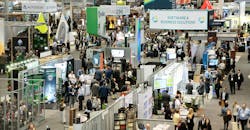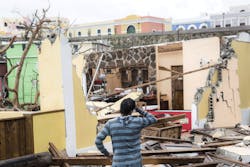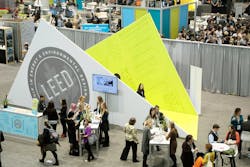Greenbuild 2018: Resiliency is the Word
Hurricanes. Tornados. Mudslides. Wildfires. Flooding. Volcanoes. Earthquakes. In 2017, more natural disasters occurred around the globe than ever before. Natural disasters not only impact human lives, they also take a toll on our cities’ infrastructure and the built environment.
"Many of our nation’s infrastructure elements — including buildings of all types, as well as components of our energy, transportation, water and sanitation systems — were not built to withstand the impending range of climate conditions and increased frequency of extreme weather events projected for the future," notes the U.S. Climate Resilience Toolkit website (https://toolkit.climate.gov).
Mechanical systems may not be able to heat and cool in extreme weather. Stormwater management systems may be unable to handle extreme precipitation events. Flooding can compromise structures’ foundations. Power outages can cause indoor temperatures to rise or plummet quickly in extreme weather.
"In 2015 alone, losses due to natural disasters in the United States totaled $26.4 billion," the site reports. "Compounding these issues is a swelling global population and rapid urbanization. Bolstering outdated structures and implementing updated building codes may help reduce vulnerabilities."
This year’s Greenbuild International Conference and Expo, Nov. 14-16 in Chicago, is tackling this issue. The overall theme is "Humans X Nature," and resiliency is taking a much larger role than in previous years. Greenbuild’s closing keynote speaker will be Carmen Yulín Cruz, below, the mayor of San Juan, Puerto Rico.
In September 2017, Hurricane Maria ravaged the U.S. territory of Puerto Rico, leading to widespread power outages, lack of suitable shelter and unsafe drinking water. Cruz has since become a vocal advocate for Puerto Rican citizens, lobbying Congress for aid to restore the power grid and enhance infrastructure.
"The impact of climate change is real," Cruz says. "We are the living example of what happens when nature challenges every aspect of our lives. Not only are the immediate effects of a devastating hurricane life-altering but the crippling effects of its aftermath make us understand that cities must take notice and transform themselves into resilient communities looking for permanent solutions to recurring problems."
Greenbuild 2018 is featuring two workshops on the U.S. Green Building Council’s newer programs, LEED for Cities and LEED for Communities. These two certification programs enable cities to measure and track outcomes and are evaluated based on 14 key metrics that include energy, water, waste, transportation, education, health, safety, prosperity and equitability. This ultimately leads back to city-wide connectivity and resiliency.
Many education sessions throughout the conference also deal with resiliency issues, including:
- Neighborhood Transformation and Smart Cities: A Community Plans for Increased Sustainability and Resiliency. Electric utility ComEd’s pilot project in Chicago’s Bronzeville neighborhood to build a community microgrid;
- Climate Adaptive Design. Move beyond code solutions to address specific issues such as sea level rising, wet and dry flood-proofing, and fire-retardant strategies;
- Preparing for Your Storm: Resiliency Isn’t One-Size-Fits-All. A look at three case studies of hard-hit, affordable housing communities focusing on design and construction, emerging technologies and operational approaches;
- 44 Inches of Rain: Post-Harvey Strategies. This session will show how sensitive engineering practices can create flood control infrastructure that significantly reduces flooding even in already built-out watersheds while creating new green space for the public;
- Designing for Future Climate: From Theory to Application. Most of the $8.7 trillion global construction volume uses historical weather data to size building and infrastructure services. Much of that data is already a quarter-century or more outdated. This session focuses on how to use climate change data in design;
- A Model Zoning Code for Resilient Communities. The development of a new tool for planners, policy makers, developers and design practitioners to advocate for resilient and sustainable development.
Energy Efficiency in Multifamily Buildings
In the United States, about a quarter of households live in multifamily housing such as apartments and condominiums. Improving the energy efficiency of these buildings by 20 percent will save nearly $7 billion in energy costs each year. Engaging tenants in energy-efficient initiatives in multifamily dwellings is the subject of several educational sessions at Greenbuild 2018, as well as ventilation, IAQ and net-zero:
- Energy Efficiency and Energy Star Tenant Space in Action. This panel will focus on how recognition programs such as the Energy Star Tenant Space recognition and the Institute for Market Transformation’s Landlord-Tenant Energy Partnership and Green Lease Leaders award program are key to helping landlords and tenants integrate energy efficiency through the duration of a lease;
- Energy Conservation’s Newest Frontier: Engaging the Multifamily Community. Apartment and condo management teams have started benchmarking buildings but focus on the common areas of the multifamily buildings. Engaging onsite property staff and residents to change their behavior is a new area in the commercial sustainability movement;
- Utility Benchmarking Glory. Multifamily housing providers are often unaware of how their buildings’ energy performance compares to that of similar buildings. In 2016/2017 the Better Buildings Challenge embarked on the "Year of Data," a utility benchmarking initiative designed for the BBC’s 100+ multifamily sector partners;
- Ventilation and Energy Recovery in High-Rise Residential Buildings. Air-to-air energy recovery ventilation is rapidly becoming the means to achieve better multifamily residential buildings. The session will discuss ERV’s and their performance metrics, code requirements and certification criteria;
- Arc’s Performance Score. This score is providing a pathway for all buildings, communities and cities to track and manage performance using energy, water, waste, transportation and human experience data;
- Nearly Zero Energy with Net-Zero Cost. How can near-zero-energy housing be built cost-effectively? This session explores this topic from multiple perspectives — design, development and construction — and addresses how the approach to performance and affordability changes at different scales, from single-family to multifamily buildings;
- The Building Envelope as a System. One fundamental method to achieve deep green buildings is optimizing the envelope with the mechanical and electrical systems;
- Health and Housing: The Next Frontier in Development. Americans spend an average of 90 percent of their time indoors — about 65 percent of which is spent at home. Fitwel is a global, high-impact certification system that supports individual and community health through improvements to building design and operations.
Other Noteworthy Events
Human rights lawyer Amal Clooney will give the Opening Plenary keynote address. "Green building is about providing equal access to safe, healthy and sustainable environments for everyone," says Kate Hurst, senior vice president of conferences and events, USGBC. "Amal has a deep understanding of this."
The Women in Green Power Luncheon celebrates the power of purpose to shape their lives, their careers and their changing world. Speaking will be Jessica N. Grounds, who founded multiple organizations to advance women in leadership roles and served in 2016 as director of the national grass-roots campaign ‘Women Ready for Hillary.’
On the Expo floor, the Tiny Home Village debuts this year, featuring space-saving urban dwellings built with sustainability in mind and energy efficiency in practice.
To learn more about Greenbuild or to register, visit www.greenbuildexpo.com.
About the Author

Kelly L. Faloon
Contributing Writer/Editor
Faloon spent 3 1/2 years at Supply House Times before joining the Plumbing & Mechanical staff in 2001. Previously, she spent nearly 10 years at CCH/Wolters Kluwer, a publishing firm specializing in business and tax law, where she wore many hats — proofreader, writer/editor for a daily tax publication, and Internal Revenue Code editor.
A native of Michigan’s northern Lower Peninsula, Faloon is a journalism graduate of Michigan State University. You can reach her at [email protected].



